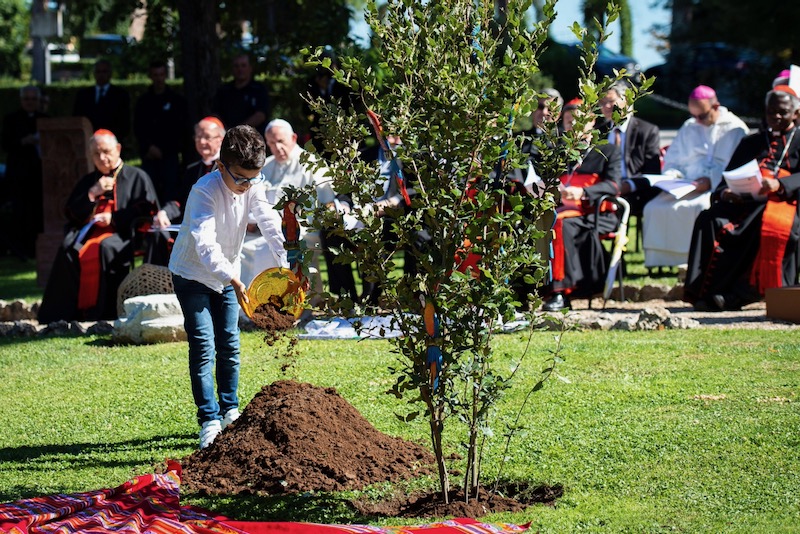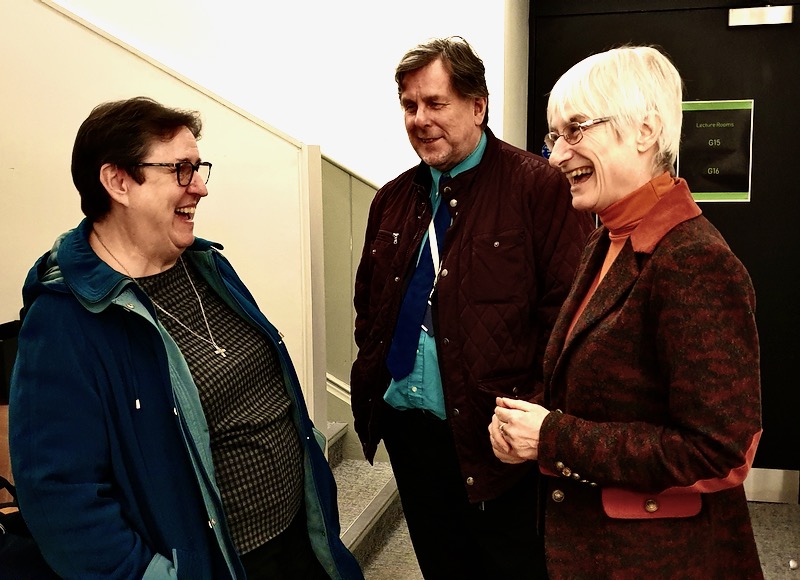Contributions from Religious to the Synod contained a “powerful and fearless critique” of clericalism and a “clear call” for lay people and Religious to be involved in the formation of seminarians, according to a member of the group charged with drawing up the summary.
Delivering an address at Trinity College Dublin, Dr Gemma Simmonds CJ said members of religious orders felt that lay and religious involvement in formation might help a “more participative and welcoming” Church to emerge and ensure that ordained ministry was seen not as “a clerical caste” but a “refined form of the baptismal vocation” in line with the teaching of Vatican II.
Dr Simmonds was one of four religious on the synthesising commission for Religious asked to produce the summary from the contributions received from hundreds of religious communities worldwide for the Synod on Synodality. The other commission members were José Cristo Rey García Paredes CMF, Maria Cimperman RSCJ and Orlando Torres SJ.
The religious sister, who is Director of the Religious Life Institute at the Margaret Beaufort Institute of Theology in Cambridge, was in Dublin to deliver the final lecture in the Loyola Institute’s Lenten Series: “Authentic, Effective Reform in the Church: Reading Yves Congar Today”.
In her talk on “True and False Reform Today’” she said the religious contributions to the synod spoke with “openness and courage” about situations that must change if religious life itself and the wider Church are to survive and flourish.
They offered “a vigorous self-critique”, as well as a critique of “oppressive attitudes and practices within the wider Church” which are preventing the general life of the Church from achieving its full potential.
They spoke out of their “zeal and energy” she said, of “the signs of hope in the synodal process that they find in every human context and corner of the world”.
The theologian, who is a member of the Congregation of Jesus, noted that the Catholic Church provides 25 per cent of the global response to HIV and AIDS and that the experience of religious in caring for those who are most profoundly impacted by the AIDS pandemic was “a very powerful one”.
“They are the ones who are on the ground seeing people dying with HIV and AIDS. That raises its own questions about Church teaching on safe sex and the like,” she said.
Collating the synthesis offered “a bird's eye view, not only of religious life today, but of the life lived by those who are very often on the front line of the Church's delivery of its apostolic mission, from one end of the globe to the other”.
The “biggest surprise” was the convergence in what was being said. “What was definitely most striking to us was precisely the united voice that came both from the global north and from the global south, from political, economic, and social contexts that differ massively from one another, but in which so often, one and the same reflective voice resonated.”
In her lecture, she placed the late French theologian Yves Congar OP and his ideas of true and false reform into conversation with what had been learned from the Synod response from the religious.
Referring to her work on hope over lockdown and the Covid pandemic and the need for hope in the Church, she said, “It feels, at least in my part of the world, as if hope has been in rather short supply within the Catholic Church of late.”
One challenge she identified came from those who critique of the Synod as “an extended exercise in disloyalty that is destroying faith, hope and love for the Church”. She did not agree with that analysis.
She highlighted how Congar had had his critics too. He argued that “self-critique of the Church does not lie in a lack of loyalty” as was claimed in his time and is being claimed today.
On the contrary, he countered that it lies precisely in “a deep attachment to the Church” and a desire to be able to trust despite the disappointment of someone who loves and expects a great deal from the Church. It was not a “crisis of loyalty”.
Dr Simmonds explained that her work on hope was centred on Pope Benedict’s encyclical Spe Salvi, which in its opening paragraphs said the Christian message is not only informative, but performative. “Hope makes things happen and is life changing. The one who has hope lives differently,” she quoted.
And at the heart of that is the essence of what true reform in the Church is. “True reform is something that must be performative. It cannot stay at the level of grand statements, nor can it stay at the level of aspiration.”
She acknowledged that many people ask with “some trepidation”, what is the future of the Church? “Nobody is asking that question with greater urgency than the religious, certainly in the global north, who are seeing their median age rise exponentially, and are not seeing much of a structural future ahead of them.”
“But if hope is life-changing, and if it makes things happen, then we are invited to believe, both in the Church and within religious life, that the dark door of time, of the future, has been thrown open and is thrown open by the impetus for reform within the Church.”
Writing about the urgency of reform in the Catholic Church of the 16th century, Congar noted that a major problem in the push for reform at that time was the failure of the hierarchy to develop a sense of urgency.
“We are in the midst of a major push for reform led by Pope Francis himself through the global Synod,” she said. While some may ask what is the point and if genuine reform was possible, her own response was “the process is the product”.
“Once we have engaged with this process, we have become different people” because of the discussions heard and witnesses listened to. “The reform – the change starts when we open ourselves to being changed by what we hear when we listen to one another. And when we have the courage to tell one another the truth.”
Any authentic reform must come in dialogue with those whose vocation it is, mandated by the Church, both to teach and to lead.
There is little call for shifts in doctrine or teaching as such, but a loud call for a broader and more genuine understanding of what lies within the Church’s teaching.
She highlighted that there is a call for a profound shift in structures and methods of leadership, from problem-solving to appreciative inquiry, from leadership as power to servant and transformational leadership, which changes the understanding of obedience from one of “silent compliance to one of mutual discernment, shared decision making and communal discernment”.
Gemma Simmonds said Pope Francis was engaged in “a kind of inside-out movement” and all were called to be “missionaries of listening”, whose key verbs are listening, participating, praying, and seeking.
The weeds seen by religious as choking the seeds of synodality included the climate of division and polarization within the Church. Some religious expressed scepticism that critical voices would be heard without being censored in their diocese or their parish. They saw theological, moral, social and liturgical fundamentalisms as stifling the seeds of synodality and therefore a counter reform.
“And when such fundamentalist movements are supported by political, economic and media groups, who are trying to regain patriarchal power, and establish a pre-Vatican II model of seminary formation, it was seen as a profoundly pernicious cultural influence,” Dr Simmonds said.
Those from the global south also named things like the caste system, tribalism, regionalism, nationalism, as movements, which in and of themselves, are deeply contrary to the spirit of baptism described by Paul.
They flagged up repeatedly the problem of sexism both within decision-making structures and in the language of the Church, and how women are excluded from meaningful roles in the life of the Church. Women religious were often regarded as cheap labour and discriminated against within Church structures when they did not receive a fair wage for their ministries and services.
The patriarchal and hierarchical model, which favours clericalism, and considers the clergy as a race apart, disregards the fundamental dignity of every baptised person, the religious felt. This model disrespected the laity and prevented collaboration and mutual relationships.
“This was seen as being toxic for priests as well as toxic for the laity and placing intolerable burdens on many good men who go forward in a desire for service to the priesthood,” the Director of the Religious Life Institute said.
Elsewhere in her address in Trinity College Dublin, Dr Simmonds said the Church in the global north had been “devastated” by the impact of abuses of power, of conscience, and of the person within the church and by “justified” accusations that leaders did not recognise the urgency of the problem until it was too late, or fatally, called into question the principle of dealing with such accusations in a way that was consistent with justice and with the gravity of the crimes committed.
Many religious believe, “the churches of the global south have barely begun to deal with these issues and the response when they do, will be a tsunami.”
Dr Simmonds said that in the Synod response, religious also spoke of the need to listen to the lived experience of those who find themselves at odds with the Church’s teaching, whether that is about the role of women within the Church, or the acceptance within the Eucharistic community of those who are divorced or separated, or those who identify themselves as LGBTQ.
“We specifically and deliberately checked the origin of these responses and we were surprised to find that they did not exclusively come from the global north, but also from countries within the global South, where such identification carries severe social and political penalties, including imprisonment and death.”
“If we are to have true reform, it seems to me that one of the things we need to do is actually take off our unconscious cultural spectacles and try as best we can, in the light of the gospel, to see the world with the eyes of Christ Himself. We will only do that if we talk to one another. We will only do that as Congar and his ressourcement theologian companions tell us, if we return to the sources, the sources of the Scriptures themselves, the source of the life of the Church.”



 Loading ...
Loading ...